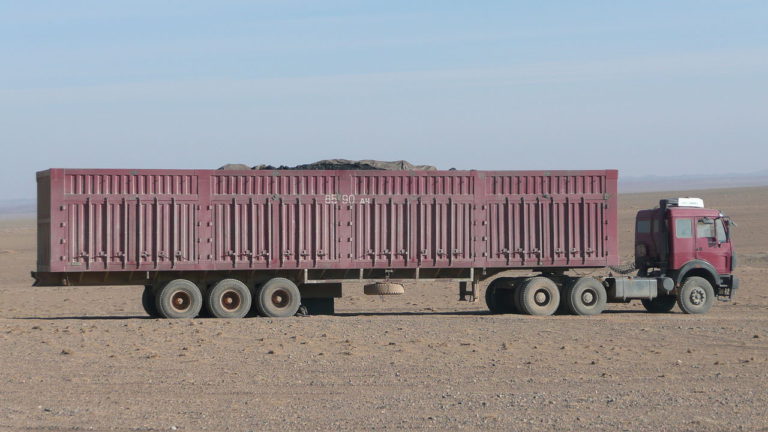China Gets Coal Lifeline Before Winter With Mongolia Rail Spur

September 16, 2022 - China’s efforts to make sure it’s well-stocked with its mainstay fuel for what promises to be a grueling winter for energy markets received a boost with the completion of a new rail line in Mongolia last week.
The 240-kilometer (149-mile) spur from the Tavan Tolgoi coal mine in the Gobi Desert to China’s border officially opened last week and is already showing dividends. With trucks now only having to make a short journey through the border zone instead of a long-haul trip from the coal mine, the land port at Ganqimaodu recorded 668 crossings on Monday, up from an average of 560 in August, China Coal Resources reported.

Coal truck heading from Tavan Tolgoi to China.
Credit: Wikipedia
Clearances are expected to gradually increase to about 700 a day and the port has tested its ability to boost that to 900, according to the report. Mongolian President Khurelsukh Ukhnaa said in a speech last week that the rail line could haul as much as 50 million tons a year to the border. The country exported a record 36 million tons in 2019 before flows slowed dramatically because of stricter Covid-19 border controls.
While Mongolian coal tends to be used more by steelmakers than power plants, a boost in shipments could help ballast Chinese stockpiles ahead of the winter heating season. A historic drought in Sichuan and Yunnan is forcing hydropower dams to reduce generation, requiring more fossil fuels to be burned around the country to make up the difference. With international coal and gas prices near records amid soaring European demand, Chinese utilities will be keen to avoid having to tap seaborne supplies as much as possible.
The rail spur is also expected to be a boon for Mongolian miners, which rely on China to buy nearly all of their exports. It will reduce the cost of transporting coal to the border to $12 a ton from $47, according to China Coal Resource, and revenue from coal exports is expected to double, Khurelsukh said last week.

